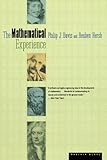Found in 6 comments on Hacker News
btilly · 2020-02-14
· Original
thread
The Mathematical Experience is not a history of mathematics per se, but there is a lot of history and context in it. Highly recommended.
https://www.amazon.com/Mathematical-Experience-Phillip-J-Dav... is a link to Amazon.
firebones · 2018-07-28
· Original
thread
I'm not who you are asking, but this book https://www.amazon.com/Mathematical-Experience-Phillip-J-Dav... hits some of the philosophy of math. It's been a long time since I've dipped into it, but IIRC, it puts mathematical discoveries and exploration into more of a cultural and philosophical context. I could see this being sampled for a good crossover course that would cover humanities requirements for STEM, and STEM requirements for humanities.
btilly · 2017-02-09
· Original
thread
My experience is that non-mathematicians like to have GED on their coffee tables as a conversation piece. The related book that mathematicians like is https://www.amazon.com/Mathematical-Experience-Phillip-J-Dav.... (High school math is enough to enjoy it, but the more math you have, the more you'll get out it. All of the way up to the PhD level.)
cma · 2010-08-23
· Original
thread
"The Mathematical Experience" goes into this in pretty good depth.
http://www.amazon.com/Mathematical-Experience-Phillip-J-Davi...
cma · 2009-12-08
· Original
thread
If you are interested in this topic and you haven't already done so, check out "The Mathematical Experience"
http://www.amazon.com/Mathematical-Experience-Phillip-J-Davi...


The truth is.
The proof is a mechanism to reach that consensus, by convincing other mathematicians of a specific truth. That is all it is.
There is a naive idea that a proof is a purely mechanical series of steps that provides access to truth. Last I checked, this isn't so for the vast majority of proofs in math. Such a proof would be way too tedious to construct or check by mathematicians. And if it isn't checkable, how do we know it is actually true?
Automated proofs are a subfield, and (again, last I checked) controversial because they can often not be checked by humans.
So for example, if the proof doesn't convince other mathematicians, then it's not a a proof.
Or it might convince other mathematicians and later turn out to be wrong after all.
For more on the practical aspects of math, I highly recommend The Mathematical Experience.
https://www.amazon.com/Mathematical-Experience-Phillip-J-Dav...
I read it in German:
https://www.amazon.com/Erfahrung-Mathematik-German-P-J-Davis...